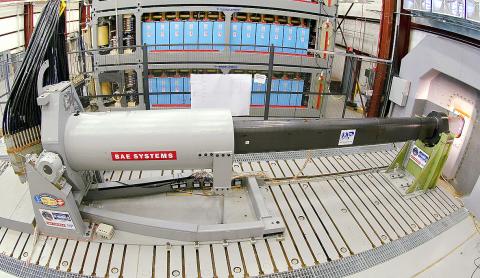New advances in the development of electromagnetic rail guns (ERG) could have a major impact on the defense of Taiwan, an expert in Asian military affairs said.
“[ERGs] could be ready by the early 2020s,” International Assessment and Strategy Center senior fellow Rick Fisher said.
US Navy officials revealed this week that they plan to test-fire a rail gun at sea for the first time in the summer of next year.

Photo: AP
The gun is to fire a series of hypervelocity projectiles fitted with GPS electronics at a barge floating in the ocean about 80km from Eglin Air Force Base in Florida.
Directed Energy and Electric Weapon Systems program manager US Navy Captain Mike Ziv told a US Navy League symposium that the first firing was a “significant event” and a “key learning point.”
The symposium was told that rail guns could fire guided, high-speed projectiles more than 160km and could be a formidable defense against cruise and ballistic missiles.
“This one technology has the potential to reverse the ‘cost-benefit ratio’ on the Taiwan Strait and to extend real deterrence potential for another decade, while allowing Taipei to sustain a largely defensive military strategy,” Fisher told the Taipei Times.
He said that Taiwan was buying US$3 million missile interceptors to shoot down US$1 million Chinese short-range ballistic missiles.
Rail guns could be able to shoot down Chinese missiles and attack aircraft with projectiles at much less cost.
“It can perform missile defense, air defense and anti-invasion missions, and also attack most of the new long-range anti-aircraft missile systems China is basing near the Taiwan Strait to threaten Taiwan’s air force,” Fisher said.
He said: “If China’s leaders see they cannot overwhelm Taiwan with missile strikes, achieve air superiority and thus assure the security of its invasion fleet, they will probably think more than twice about attacking Taiwan.”
“These are the potential benefits for Taiwan of the rail gun,” he said.
Fisher added: “It is a strategic and moral necessity for Washington to be working with Taipei to enable the early transfer of rail gun technology.”
According to the Defense Tech Web site, the rail gun being developed by the US Navy uses electricity to create a magnetic field to propel a kinetic energy projectile at about 5,600 miles per hour (9,000kph).
It can accelerate a 45-pound (20kg) projectile from zero to 5,000 miles per hour (8,046kph) in less than a second, the Web site said.
The projectiles, able to travel at 2,000 meters per second, would cost less than US$100,000 each, while the gun would be able to fire them at a rate of about one every six seconds.

AIR SUPPORT: The Ministry of National Defense thanked the US for the delivery, adding that it was an indicator of the White House’s commitment to the Taiwan Relations Act Deputy Minister of National Defense Po Horng-huei (柏鴻輝) and Representative to the US Alexander Yui on Friday attended a delivery ceremony for the first of Taiwan’s long-awaited 66 F-16C/D Block 70 jets at a Lockheed Martin Corp factory in Greenville, South Carolina. “We are so proud to be the global home of the F-16 and to support Taiwan’s air defense capabilities,” US Representative William Timmons wrote on X, alongside a photograph of Taiwanese and US officials at the event. The F-16C/D Block 70 jets Taiwan ordered have the same capabilities as aircraft that had been upgraded to F-16Vs. The batch of Lockheed Martin

GRIDLOCK: The National Fire Agency’s Special Search and Rescue team is on standby to travel to the countries to help out with the rescue effort A powerful earthquake rocked Myanmar and neighboring Thailand yesterday, killing at least three people in Bangkok and burying dozens when a high-rise building under construction collapsed. Footage shared on social media from Myanmar’s second-largest city showed widespread destruction, raising fears that many were trapped under the rubble or killed. The magnitude 7.7 earthquake, with an epicenter near Mandalay in Myanmar, struck at midday and was followed by a strong magnitude 6.4 aftershock. The extent of death, injury and destruction — especially in Myanmar, which is embroiled in a civil war and where information is tightly controlled at the best of times —

China's military today said it began joint army, navy and rocket force exercises around Taiwan to "serve as a stern warning and powerful deterrent against Taiwanese independence," calling President William Lai (賴清德) a "parasite." The exercises come after Lai called Beijing a "foreign hostile force" last month. More than 10 Chinese military ships approached close to Taiwan's 24 nautical mile (44.4km) contiguous zone this morning and Taiwan sent its own warships to respond, two senior Taiwanese officials said. Taiwan has not yet detected any live fire by the Chinese military so far, one of the officials said. The drills took place after US Secretary

THUGGISH BEHAVIOR: Encouraging people to report independence supporters is another intimidation tactic that threatens cross-strait peace, the state department said China setting up an online system for reporting “Taiwanese independence” advocates is an “irresponsible and reprehensible” act, a US government spokesperson said on Friday. “China’s call for private individuals to report on alleged ‘persecution or suppression’ by supposed ‘Taiwan independence henchmen and accomplices’ is irresponsible and reprehensible,” an unnamed US Department of State spokesperson told the Central News Agency in an e-mail. The move is part of Beijing’s “intimidation campaign” against Taiwan and its supporters, and is “threatening free speech around the world, destabilizing the Indo-Pacific region, and deliberately eroding the cross-strait status quo,” the spokesperson said. The Chinese Communist Party’s “threats